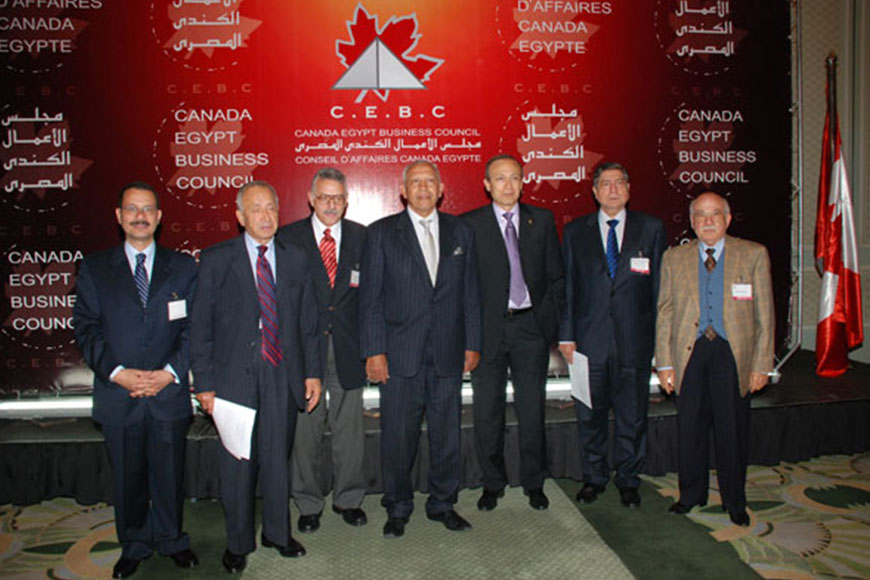
Date
Speaker(s)
Designation
Description
The Role of the Public Administrative Prosecutor in Combating Corruption
The Canada Egypt Business Council, hosted a roundtable discussion on “The Role of the Public Administrative Prosecutor in Combating Corruption”.
The event incorporated a number of distinguished guests including Counselor Dr. Taimour Mostafa-Kamel, Head of the Administrative Prosecution Authority, as a keynote speaker, who shared his outlook in ways of combating corruption that has been pervasive in the era of the old Egyptian regime.
In addition, the discussions moderated by Dr. Amr Abdel Motaal, Attorney at Law and Senior Managing Partner, Abdel Motaal, Moharram and Heiza Law Firm, were outlining the Public Administrative Prosecutor moves against corruption in the wake of the January 25th Revolution.
Mr. Motaz Raslan, Chairman of the CEBC, commenced his opening remarks by acknowledging the guests in attendance and discussing the gloomy consequence of corruption that has been spreading in the administrative system of the state prior to the January 25 revolution. He went on to explain that Egypt’s welfare and development landscapes have changed dramatically in the past era since the start of the diffusion of corruption. He also affirmed that the first line of defense for any country is the Administrative Prosecution. However, he added, the successive regimes and governments have weaken that significant body and tried to defuse its content, which in fact had hindered the existence of an actual effective accounting party for a very long time.
Optimistically, Mr. Raslan went on to speak about the role of the revolution in surmounting the ominous consequences of the fraud and corruption through progressing the key role and impact of the Administrative Prosecution, which in fact turned to be a very significant unit. “This is especially as we embark on an era of transparency and clear accountability”, he affirmed.
He then highlighted Dr. Taimour Mostafa-Kamel’s accomplishments since taking over the duty as the Head of the Administrative Prosecution Authority, as through his successful career path, he has joined many prestigious judicial and legal Egyptian as well as international institutions. “Dr. Taimour as well, has been one of the significant advisors to the Minister of Justice for a period of four years. In addition, he was appointed as member of the board of the International Institute of Law; besides, honorably serving in the Organization of ‘La Francophonie’ for many years.” Added Raslan.
Raslan finally acknowledged that hosting such a discussion comes from the Council’s enthusiasm to effectively participate in combating all the negative influences of the old regime and assisting in promoting a campaign against corruption as a normal outcome of the success of the January 25 revolution, insisting that no one is above the law.
Mr. Raslan then gave the floor to Dr. Taimour, who underlined in his speech the importance of the reform moves that had resulted from the January 25 revolution; which he affirmed, would highly contribute to creating a fair transparent judicial units capable of monitoring the governmental authorities and uncovering corruptions existing in the government’s bodies.
He further pointed out that the Egyptian laws must be reconsidered as they encourage corruption. “They were used to protect certain individuals”, he said, pointing out to the law on monopolies in particular.
Dr. Taimour also affirmed that the unpractical laws did not allow supervisory bodies to bring violators to account, where he has already received more than 6,000 complaints since the 25 January Revolution took place.
He also highlighted the significance of the actions that have been undertaken towards restructuring the ‘Administrative Prosecution’, by increasing their numbers to 156 units, as well as establishing units of specialized prosecutors within the ministries and offices for inspection in various governorates. This is besides, strengthening the capacity and skills of their members, in addition to applying other mechanisms that tighten disciplinary sanctions.
The Head of the Administrative Prosecution Authority further pointed out that the amount of money transferred out of the country is estimated at $1.3 trillion, adding that the Egyptian economy was highly affected by the operations of corruption that have been detected recently, and the value of the smuggled money. He went on to call for a need to restore Egypt’s economic global status through improving the economic system as a whole.
He stressed that no one would escape from the punishment, pointing out that the investigations are impartial and objective and are only disclosed after the cases are thoroughly reviewed and verified. He added that corruption in Egypt included seizing state-owned land and nepotism, even within the judiciary.
Central to this endeavor, he addressed the issue of the international convention against corruption and Egypt’s efforts to fulfill its obligations towards them. He further declared that this convention is of great significance, and there are major international efforts to combat financial and administrative corruption, where he explained that the corruption is a global phenomenon affecting not only the affluent societies, but extended to developing ones as well.
Dr. Taymor finally explicated that according to Transparency International, Egypt was ranked the third country in Africa in terms of sending money abroad. “However, I expect an improvement in our ranking as many cases of corruption have been opened since the revolution.” he added.
During moderating the discussions, Dr. Amr Abdel Motaal, Chair of the Legal Committee of Canada Egypt Business Council, explained that the gap between the previously existing legislation and ways of their application were the true reasons leading to the revolution.
He further noted that there were indicators and reports revealing the spread of corruption and irregularities, yet they were not taken with seriousness.
The meeting was followed by a question and answer session, which covered topics such as the absence of effective political and judicial accountable bodies, abolishing public tender laws, the absence of democracy and how to improve the human rights of Egyptians, unfair distribution of wages and income as well as a call for the cancellation of contracting by direct orders.
















